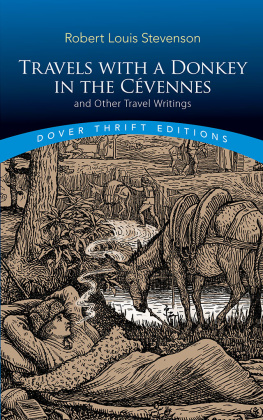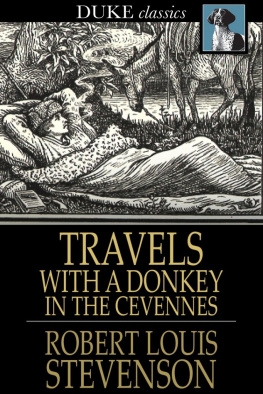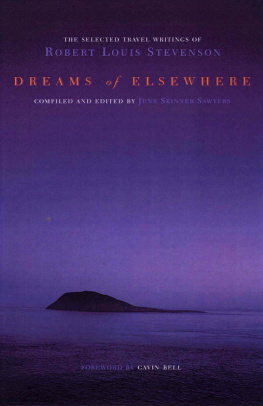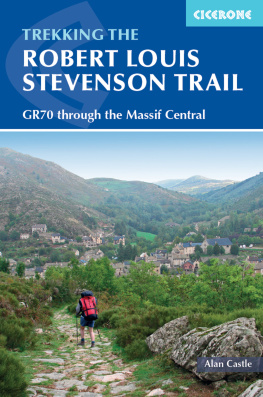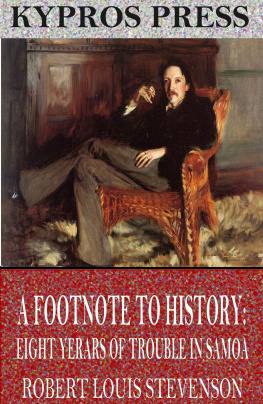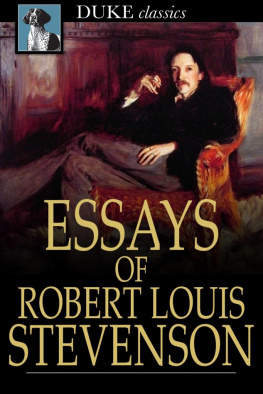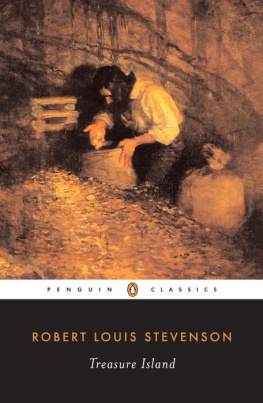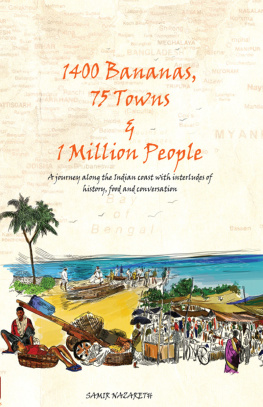
DOVER THRIFT EDITIONS
GENERAL EDITOR: SUSAN L. RATTINER
EDITOR OF THIS VOLUME: MICHAEL CROLAND
Copyright
Copyright 2019 by Dover Publications, Inc.
All rights reserved.
Bibliographical Note
This Dover edition, first published in 2019, is a new selection of three pieces by Robert Louis Stevenson, reprinted from standard texts. A new introductory note has been specially prepared for this volume.
Library of Congress Cataloging-in-Publication Data
Names: Stevenson, Robert Louis, 18501894, author.
Title: Travels with a donkey in the Cvennes : and other travel writings / Robert Louis Stevenson.
Description: Mineola, New York : Dover Publications, Inc., 2019. | Series: Dover thrift editions | This Dover edition, first published in 2019, is a new selection of three pieces by Robert Louis Stevenson, reprinted from standard texts. A new introductory note has been specially prepared for this volume. | Includes bibliographical references.
Identifiers: LCCN 2018026112 | ISBN 9780486829319 | ISBN 0486829316
Subjects: LCSH: Stevenson, Robert Louis, 18501894TravelFrance. | FranceDescription and travel. | LCGFT: Travel writing.
Classification: LCC PR5488 .T8 2019 | DDC 824/.8dc23 LC record available at https://lccn.loc.gov/2018026112
Manufactured in the United States by LSC Communications
82931601 2019
www.doverpublications.com
Note
ROBERT LOUIS STEVENSON was born on November 13, 1850, in Edinburgh, Scotland. As a child, he suffered from fevers, coughing, bronchial infections, and hemorrhaging of the lungs. His formal education was limited because of his medical problems. His nurse read him stories, cultivating his imagination and inspiring him to become a writer.
Stevensons parents expected that when he arrived at Edinburgh University in 1867, he would study science so that he could join the familys lighthouse engineering company. He had little interest, and he aspired to be a writer instead. As a compromise, he studied law, in case his writing career did not work out. He received his law degree in 1875, but he never worked as a lawyer.
During summer vacations from school, Stevenson spent time in France with other writers and artists, which led to his travel writing. His first essay, Roads, was published in 1873. Forest Notes was written during the summer of 1875 and published in the Cornhill Magazine in May 1876. His first book, An Inland Voyage, which recounted his canoe trip from Antwerp to Northern France, was published in 1878. Travels with a Donkey in the Cvennes, which detailed his hiking trip in South-Central France with a donkey named Modestine, was published in 1879.
Stevensons writing career took off with his novels in the 1880s. His first taste of popularity and profit came with Treasure Island in 1883. The Strange Case of Dr. Jekyll and Mr. Hyde was an immediate success and spawned innumerable stage productions and films. His other standout books were Kidnapped (1886), The Master of Ballantrae (1889), and Catriona (1893).
Stevenson met the love of his life, Fanny Osbourne, in France in September 1876, when he was twenty-five and she was thirty-six. She was an American who was separated from her husband and had two children. Stevenson and Osbourne got married in 1880 and lived in California. From 1888 until his passing, Stevenson and his new family traveled the Pacific islands, eventually settling in Samoa. He died of a stroke on December 3, 1894.
Upon his death, The Illustrated London News said, He is gone, our Prince of storytellers... with the insatiable taste for weird adventure, for diablerie, for a strange mixture of metaphysics and romance.
Contents
AN INLAND VOYAGE
Thus sang they in the English boat.
Marvell
PREFACE TO THE FIRST EDITION
TO EQUIP SO small a book with a preface is, I am half afraid, to sin against proportion. But a preface is more than an author can resist, for it is the reward of his labours. When the foundation stone is laid, the architect appears with his plans, and struts for an hour before the public eye. So with the writer in his preface: he may have never a word to say, but he must show himself for a moment in the portico, hat in hand, and with an urbane demeanour.
It is best, in such circumstance, to represent a delicate shade of manner between humility and superiority: as if the book had been written by some one else, and you had merely run over it and inserted what was good. But for my part I have not yet learned the trick to that perfection; I am not yet able to dissemble the warmth of my sentiments towards a reader; and if I meet him on the threshold, it is to invite him in with country cordiality.
To say truth, I had no sooner finished reading this little book in proof than I was seized upon by a distressing apprehension.
It occurred to me that I might not only be the first to read these pages, but the last as well; that I might have pioneered this very smiling tract of country all in vain, and find not a soul to follow in my steps. The more I thought, the more I disliked the notion; until the distaste grew into a sort of panic terror, and I rushed into this Preface, which is no more than an advertisement for readers.
What am I to say for my book? Caleb and Joshua brought back from Palestine a formidable bunch of grapes; alas! my book produces naught so nourishing; and for the matter of that, we live in an age when people prefer a definition to any quantity of fruit.
I wonder, would a negative be found enticing? for, from the negative point of view, I flatter myself this volume has a certain stamp. Although it runs to considerably upwards of two hundred pages, it contains not a single reference to the imbecility of Gods universe, nor so much as a single hint that I could have made a better one myselfI really do not know where my head can have been. I seemed to have forgotten all that makes it glorious to be man. T is an omission that renders the book philosophically unimportant; but I am in hopes the eccentricity may please in frivolous circles.
To the friend who accompanied me I owe many thanks already, indeed I wish I owed him nothing else; but at this moment I feel towards him an almost exaggerated tenderness. He, at least, will become my readerif it were only to follow his own travels alongside of mine.
R. L. S.
DEDICATION
TO
SIR WALTER GRINDLAY SIMPSON
BART.
My dear Cigarette,
It was enough that you should have shared so liberally in the rains and portages of our voyage; that you should have had so hard a paddle to recover the derelict Arethusa on the flooded Oise; and that you should thenceforth have piloted a mere wreck of mankind to Origny Sainte-Benote and a supper so eagerly desired. It was perhaps more than enough, as you once somewhat piteously complained, that I should have set down all the strong language to you, and kept the appropriate reflections for myself. I could not in decency expose you to share the disgrace of another and more public shipwreck. But now that this voyage of ours is going into a cheap edition, that peril, we shall hope, is at an end, and I may put your name on the burgee.
But I cannot pause till I have lamented the fate of our two ships. That, sir, was not a fortunate day when we projected the possession of a canal barge; it was not a fortunate day when we shared our day-dream with the most hopeful of day-dreamers. For a while, indeed, the world looked smilingly. The barge was procured and christened, and, as the Eleven Thousand Virgins of Cologne, lay for some months, the admired of all admirers, in a pleasant river and under the walls of an ancient town; M. Mattras, the accomplished carpenter of Moret, had made her a centre of emulous labour; and you will not have forgotten the amount of sweet champagne consumed in the inn at the bridge end, to give zeal to the workmen and speed to the work. On the financial aspect, I would not willingly dwell. The Eleven Thousand Virgins of Cologne rotted in the stream where she was beautified. She felt not the impulse of the breeze; she was never harnessed to the patient track-horse. And when at length she was sold, by the indignant carpenter of Moret, there were sold along with her the Arethusa and the Cigarette, she of cedar, she, as we knew so keenly on a portage, of solid-hearted English oak. Now these historic vessels fly the tricolour and are known by new and alien names.

